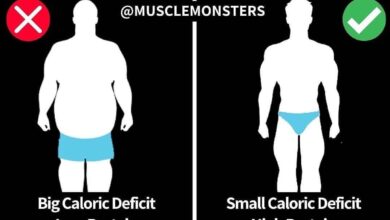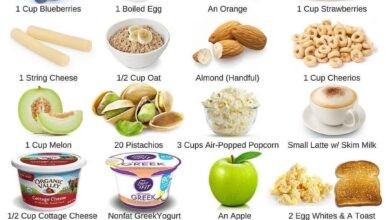
Can Burgers Be Healthy? A Guide to Making Smart Choices
Can burgers be healthy? It’s a question that has plagued burger lovers for years. While the image of a greasy, cheese-laden burger might spring to mind, the truth is that burgers can be a part of a balanced diet when made with the right ingredients and in moderation.
From lean meats and whole-grain buns to a rainbow of vegetables, there are plenty of ways to create a burger that satisfies your taste buds without sacrificing your health goals.
This guide will delve into the nutritional value of burgers, explore factors that influence their healthiness, and offer tips for making healthier choices. We’ll also discuss how to incorporate burgers into a balanced diet, debunking common myths and providing practical advice to help you enjoy your favorite burger without guilt.
The Nutritional Value of Burgers

Burgers, a beloved staple in many diets, are often perceived as unhealthy due to their high fat content. However, the nutritional value of a burger can vary significantly depending on the ingredients and preparation methods. Understanding the nutritional composition of burgers can help you make informed choices about your diet.
Nutritional Composition of Burgers
A typical burger consists of a patty, bun, and various toppings. The nutritional value of a burger can be broken down into protein, fat, carbohydrates, and vitamins.
- Protein:The primary source of protein in a burger is the patty, which can be made from beef, chicken, turkey, or plant-based alternatives. The amount of protein varies depending on the type of meat or substitute used. For example, a 4-ounce beef patty contains approximately 25 grams of protein.
- Fat:Fat is another significant component of burgers, particularly from the patty and cheese. The type of fat can vary, with lean beef containing more unsaturated fats, while ground beef with a higher fat content has more saturated fat. The amount of fat in a burger can be influenced by the type of meat, the cooking method, and the toppings.
- Carbohydrates:The bun is the primary source of carbohydrates in a burger. White bread buns are typically higher in simple carbohydrates, while whole-grain buns offer more fiber and complex carbohydrates. Toppings like ketchup and pickles also contribute to the carbohydrate content.
Can burgers be healthy? It’s a question that pops up in my mind whenever I crave a juicy patty. The answer, of course, depends on the ingredients and how they’re prepared. But sometimes, I find myself craving those old comfort foods that might not be the healthiest.
It’s in these moments that I remind myself of the importance of rediscovering lost healthy habits, like swapping out processed meats for leaner options or incorporating more vegetables. Ways to rediscover lost healthy habits can help us enjoy our favorite foods while still making mindful choices.
So, can burgers be healthy? Absolutely! It’s all about finding the right balance.
- Vitamins:Burgers can provide a source of essential vitamins, particularly if they include vegetables and whole-grain buns. For instance, lettuce, tomatoes, and onions are good sources of vitamins A, C, and K. Whole-grain buns are a source of B vitamins, including thiamin and niacin.
Health Benefits of Burger Ingredients, Can burgers be healthy
While burgers are often associated with unhealthy eating, some ingredients can offer health benefits.
Can burgers be healthy? It all comes down to the ingredients and how they’re prepared. Just like with can pasta be healthy , it’s about choosing whole-grain buns, lean meats, and plenty of fresh veggies. A burger packed with healthy ingredients can be a delicious and nutritious meal, but it’s important to be mindful of portion sizes and avoid excessive amounts of saturated fat and sodium.
- Lean Beef:Lean beef is a good source of protein, iron, and zinc. It also contains conjugated linoleic acid (CLA), which has been linked to various health benefits, including reduced risk of heart disease and cancer.
- Vegetables:Vegetables like lettuce, tomatoes, onions, and pickles add fiber, vitamins, and minerals to a burger. They also contribute to the overall flavor and texture.
- Whole-Grain Buns:Whole-grain buns provide fiber, which helps regulate digestion and promotes satiety. They also contain B vitamins, which are essential for energy production and cell function.
Nutritional Content of Different Burger Options
The nutritional content of burgers can vary significantly depending on the type of patty and toppings.
- Veggie Burgers:Veggie burgers are a popular alternative for those seeking a plant-based option. They are typically made from beans, lentils, vegetables, and grains. Veggie burgers can be a good source of protein, fiber, and vitamins.
- Turkey Burgers:Turkey burgers are often considered a healthier option than beef burgers because they are lower in fat and calories. They are also a good source of protein and iron.
- Chicken Burgers:Chicken burgers are another lean protein option that can be a healthier alternative to beef burgers. They are typically lower in fat and calories than beef burgers, but they may contain more sodium.
Factors Influencing Burger Healthiness
While the nutritional value of a burger can be influenced by the type of meat and bun used, several other factors play a significant role in determining its overall healthiness. These factors include cooking methods, toppings and condiments, and portion size.
Understanding these factors can help you make informed choices and enjoy a burger without compromising your health.
Cooking Methods
The way a burger is cooked can significantly impact its nutritional content and potential health risks.
- Grilling: Grilling is generally considered a healthier cooking method as it requires less fat and can produce flavorful burgers without excessive calories. However, grilling over high heat can lead to the formation of harmful compounds like heterocyclic amines (HCAs) and polycyclic aromatic hydrocarbons (PAHs), which are linked to cancer risk.
To minimize these risks, try grilling over medium heat and avoid charring the meat.
- Frying: Deep-frying burgers in oil adds significant calories and fat, increasing the overall calorie content and potentially raising cholesterol levels. It’s best to limit fried burgers and opt for healthier cooking methods.
- Baking: Baking is a healthy alternative to frying as it doesn’t require any added oil. It can produce a leaner burger with less fat content. However, baking might not provide the same crispy texture as grilling or frying.
Toppings and Condiments
Toppings and condiments can significantly impact a burger’s nutritional value, adding calories, fat, sodium, and sugar.
So, can burgers be healthy? It all depends on the ingredients, right? Just like how you can choose to fuel your body with healthy snacks before a long walk, you can also create a burger that supports your health goals.
And if you’re looking for a challenge that’ll get your heart pumping and your legs moving, check out everything you need to know about ultra walking. Ultra walking is a great way to push your limits and get in shape, and you can even incorporate some of those healthy burger ingredients into your pre-walk fuel!
- Cheese: Cheese is a popular burger topping that adds flavor and richness. However, cheese is high in saturated fat and calories. Opt for lower-fat cheese options or use a smaller amount to reduce the overall fat and calorie content.
- Sauces: Sauces like ketchup, mayonnaise, and mustard can contribute to a burger’s calorie and sodium content. Choose low-sodium or sugar-free options whenever possible. Some sauces are also high in fat, so be mindful of the quantity used.
- Vegetables: Adding fresh vegetables to your burger can enhance its nutritional value and provide essential vitamins, minerals, and fiber. Opt for a variety of vegetables, such as lettuce, tomato, onion, and pickles, to create a balanced and flavorful burger.
Portion Size and Frequency
Portion size and frequency of burger consumption are crucial factors in maintaining a healthy diet.
- Portion Size: It’s important to be mindful of the portion size of your burger. A standard burger can contain over 500 calories, so opting for a smaller patty or sharing a burger with a friend can help reduce calorie intake.
- Frequency: While enjoying a burger occasionally can be part of a healthy diet, frequent consumption can contribute to weight gain and an increased risk of chronic diseases. Aim to limit burger consumption to once or twice a week, and choose healthier options when you do indulge.
Healthy Burger Alternatives
Burgers don’t have to be unhealthy! There are plenty of delicious and nutritious ways to enjoy a burger without sacrificing your health goals. By making smart choices about the ingredients and cooking methods, you can create a burger that is both satisfying and good for you.
Healthy Burger Recipes
Here are some examples of healthy burger recipes that incorporate lean meats, whole grains, and abundant vegetables:
- Turkey or Chicken Burgers:These lean protein sources provide a healthy alternative to beef. You can also experiment with ground lamb or bison for a slightly richer flavor.
- Black Bean Burgers:A great option for vegetarians and vegans, black bean burgers are packed with protein and fiber. You can find pre-made black bean patties at most grocery stores or make your own using canned black beans, oats, and spices.
- Salmon Burgers:Salmon is a rich source of omega-3 fatty acids, which are beneficial for heart health. You can grill or pan-fry salmon patties for a flavorful and nutritious burger.
To create a healthy burger, consider these tips:
- Use Whole Grain Buns:Opt for whole wheat, multigrain, or sprouted grain buns, which are higher in fiber and nutrients than white bread buns.
- Load Up on Veggies:Pile your burger with plenty of fresh, colorful vegetables like lettuce, tomato, onion, avocado, spinach, and bell peppers. Vegetables add vitamins, minerals, and fiber to your meal.
- Choose Healthy Toppings:Instead of cheese, opt for avocado, hummus, or a light yogurt-based dressing. You can also use mustard or salsa instead of mayonnaise.
Making Healthier Choices When Dining Out
When dining out, you can still enjoy a burger while making healthier choices:
- Ask for Substitutions:Request a whole wheat bun instead of a white bun, or ask for your burger to be grilled instead of fried. You can also request to have the cheese, mayo, or other unhealthy toppings omitted.
- Order a Smaller Size:If you’re worried about portion size, order a smaller burger or a burger with a side salad instead of fries.
- Be Mindful of Toppings:Ask for your burger to be topped with healthy options like lettuce, tomato, and onion. Avoid heavy sauces and toppings that are high in calories and fat.
Nutritional Comparison: Traditional vs. Healthy Burger
Here is a comparison of the nutritional content of a traditional burger versus a healthier alternative:
| Nutrient | Traditional Burger | Healthy Burger |
|---|---|---|
| Calories | 500-700 | 350-450 |
| Protein (grams) | 25-35 | 20-30 |
| Fat (grams) | 30-40 | 15-20 |
| Carbohydrates (grams) | 40-50 | 30-40 |
A healthy burger can be just as delicious and satisfying as a traditional burger, but with fewer calories, fat, and sodium. By making smart choices about the ingredients and cooking methods, you can enjoy a burger that is good for your body and your taste buds.
Final Summary: Can Burgers Be Healthy
Ultimately, the key to enjoying burgers without compromising your health lies in making informed choices. By understanding the nutritional value of different burger ingredients, considering the impact of cooking methods and toppings, and incorporating burgers into a balanced diet, you can savor this classic dish while maintaining your well-being.
So, go ahead, indulge in a burger – just be mindful and make it count!






